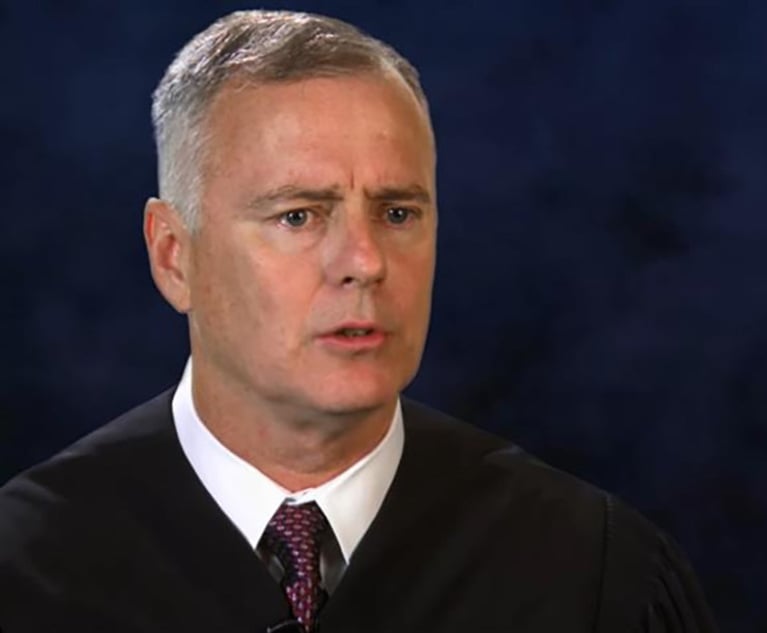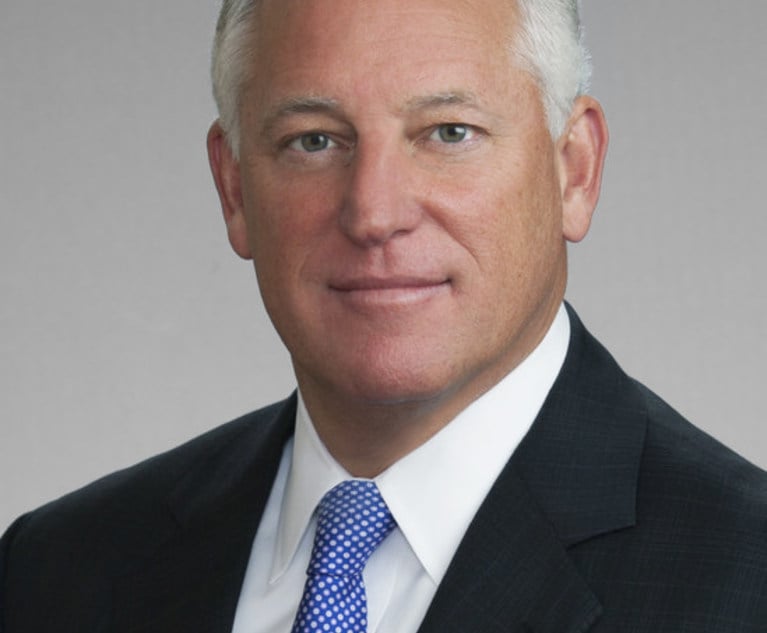RBG Movie Highlights Ginsburg's Life, Struggles and Fight for Equality
The RBG documentary captures the human and professional sides of an increasingly larger-than-life judicial icon, now 85.
May 10, 2018 at 02:26 PM
4 minute read
The original version of this story was published on National Law Journal
 Justice Ruth Bader Ginsburg, in a scene from the RBG movie. Photo courtesy of Magnolia Pictures
Justice Ruth Bader Ginsburg, in a scene from the RBG movie. Photo courtesy of Magnolia Pictures
Just in time for Mother's Day, the much-awaited RBG documentary will be showing at 150 theaters around the country this weekend, a number that will double a week later.
But this fun, poignant and informative movie about U.S. Supreme Court Justice Ruth Bader Ginsburg is not just for mothers, and nor is it just for lawyers. Lawyers really ought to see it, but you can bring nonlawyer friends and family along, and you won't have to quietly translate what's going on to your seatmates.
This is a very accessible movie about the human and professional sides of an increasingly larger-than-life judicial icon, now 85. It gives equal attention to her childhood, her family life, her law school days, her groundbreaking advocacy for gender equality in the 1970s, her rock-star popularity and her time as a judge on the D.C. Circuit and the U.S. Supreme Court.
For millennials, Ginsburg's struggle in a suffocating male-dominated legal world will bring home the gender discrimination she and other women experienced. And the movie details, without getting tedious, how Ginsburg as an ACLU lawyer carefully charted the strategy to break down that discrimination. Her central role in the legal battle for equality comes through vividly, and not everyone knows how important she was well before joining the high court.
Practice notes are embedded throughout the movie; she kept her eye on the goal of gender equality but took strategic, incremental steps to get there. The audio excerpts from her Supreme Court arguments are especially illuminating, highlighting her bold but polite statements about the impact of gender discrimination—including, wisely, in rare cases in which statutes discriminated against men, not women. (See Weinberger v. Wiesenfeld, her successful 1975 challenge to a Social Security provision that gave fewer benefits to widowers than to widows.)
Ginsburg also knew what to do when justices and other lawyers showed how clueless they were about sex discrimination—such as the time in 1978 when Justice William Rehnquist asked her, “You won't settle for putting Susan B. Anthony on the new dollar?” Ginsburg sat down without a word. In the movie, Ginsburg said, “I saw myself as a kindergarten teacher” trying to get her listeners to understand the gender issue.
Is the movie a love fest for RBG fans? Sure, most of the time—although its historical detail makes it much more than that. And it unblinkingly chronicles Ginsburg's missteps of 2016 when, in a series of interviews, she called out Donald Trump as a faker, among other things—comments, she later acknowledged, that should not be made by justices.
RBG, the movie, is not all fun and laughs. The love story between Ruth and her husband Marty runs through the narrative, with a tearful end. Martin Ginsburg died in 2010, and Justice Ginsburg was on the bench the next day. Her famous friendship with the late Antonin Scalia also ended sadly.
There are lighter moments. Ginsburg's adult children Jane and James revealed they used to keep a “Mommy Laughed” book to chronicle detours from their mother's usually serious nature.
And the movie itself proves Ginsburg can laugh. She was full of giggles when she watched the famous “Saturday Night Live” “Ginsburn” caricature of her. As her longtime friend and NPR correspondent Nina Totenberg put it, “She is such a rock star, and she is enjoying it.”
Read more:
This content has been archived. It is available through our partners, LexisNexis® and Bloomberg Law.
To view this content, please continue to their sites.
Not a Lexis Subscriber?
Subscribe Now
Not a Bloomberg Law Subscriber?
Subscribe Now
NOT FOR REPRINT
© 2024 ALM Global, LLC, All Rights Reserved. Request academic re-use from www.copyright.com. All other uses, submit a request to [email protected]. For more information visit Asset & Logo Licensing.
You Might Like
View All
Texas Court Invalidates SEC’s Dealer Rule, Siding with Crypto Advocates
3 minute read
Samsung Flooded With Galaxy Product Patent Lawsuits in Texas Federal Court

Haynes Boone, Hicks Thomas Get Dismissal of $1.3B Claims in 2022 Freeport LNG Terminal Explosion
3 minute read
In Talc Bankruptcy, Andy Birchfield Skipped His Deposition. Could He Face Sanctions?
6 minute readTrending Stories
- 1Gibson Dunn Sued By Crypto Client After Lateral Hire Causes Conflict of Interest
- 2Trump's Solicitor General Expected to 'Flip' Prelogar's Positions at Supreme Court
- 3Pharmacy Lawyers See Promise in NY Regulator's Curbs on PBM Industry
- 4Outgoing USPTO Director Kathi Vidal: ‘We All Want the Country to Be in a Better Place’
- 5Supreme Court Will Review Constitutionality Of FCC's Universal Service Fund
Who Got The Work
Michael G. Bongiorno, Andrew Scott Dulberg and Elizabeth E. Driscoll from Wilmer Cutler Pickering Hale and Dorr have stepped in to represent Symbotic Inc., an A.I.-enabled technology platform that focuses on increasing supply chain efficiency, and other defendants in a pending shareholder derivative lawsuit. The case, filed Oct. 2 in Massachusetts District Court by the Brown Law Firm on behalf of Stephen Austen, accuses certain officers and directors of misleading investors in regard to Symbotic's potential for margin growth by failing to disclose that the company was not equipped to timely deploy its systems or manage expenses through project delays. The case, assigned to U.S. District Judge Nathaniel M. Gorton, is 1:24-cv-12522, Austen v. Cohen et al.
Who Got The Work
Edmund Polubinski and Marie Killmond of Davis Polk & Wardwell have entered appearances for data platform software development company MongoDB and other defendants in a pending shareholder derivative lawsuit. The action, filed Oct. 7 in New York Southern District Court by the Brown Law Firm, accuses the company's directors and/or officers of falsely expressing confidence in the company’s restructuring of its sales incentive plan and downplaying the severity of decreases in its upfront commitments. The case is 1:24-cv-07594, Roy v. Ittycheria et al.
Who Got The Work
Amy O. Bruchs and Kurt F. Ellison of Michael Best & Friedrich have entered appearances for Epic Systems Corp. in a pending employment discrimination lawsuit. The suit was filed Sept. 7 in Wisconsin Western District Court by Levine Eisberner LLC and Siri & Glimstad on behalf of a project manager who claims that he was wrongfully terminated after applying for a religious exemption to the defendant's COVID-19 vaccine mandate. The case, assigned to U.S. Magistrate Judge Anita Marie Boor, is 3:24-cv-00630, Secker, Nathan v. Epic Systems Corporation.
Who Got The Work
David X. Sullivan, Thomas J. Finn and Gregory A. Hall from McCarter & English have entered appearances for Sunrun Installation Services in a pending civil rights lawsuit. The complaint was filed Sept. 4 in Connecticut District Court by attorney Robert M. Berke on behalf of former employee George Edward Steins, who was arrested and charged with employing an unregistered home improvement salesperson. The complaint alleges that had Sunrun informed the Connecticut Department of Consumer Protection that the plaintiff's employment had ended in 2017 and that he no longer held Sunrun's home improvement contractor license, he would not have been hit with charges, which were dismissed in May 2024. The case, assigned to U.S. District Judge Jeffrey A. Meyer, is 3:24-cv-01423, Steins v. Sunrun, Inc. et al.
Who Got The Work
Greenberg Traurig shareholder Joshua L. Raskin has entered an appearance for boohoo.com UK Ltd. in a pending patent infringement lawsuit. The suit, filed Sept. 3 in Texas Eastern District Court by Rozier Hardt McDonough on behalf of Alto Dynamics, asserts five patents related to an online shopping platform. The case, assigned to U.S. District Judge Rodney Gilstrap, is 2:24-cv-00719, Alto Dynamics, LLC v. boohoo.com UK Limited.
Featured Firms
Law Offices of Gary Martin Hays & Associates, P.C.
(470) 294-1674
Law Offices of Mark E. Salomone
(857) 444-6468
Smith & Hassler
(713) 739-1250






